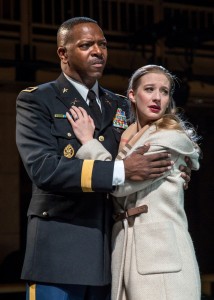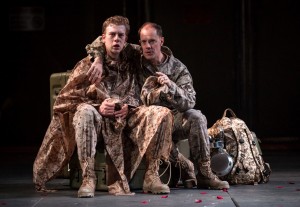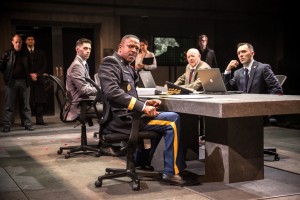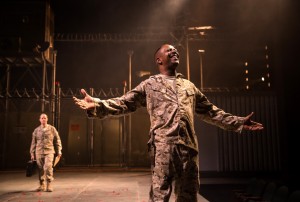BETWEEN IRAQ AND A HARD PLACE
Grim gray barracks, fortress walls topped with razor wire, smart salutes from sentry towers, cut-away trailers deployed as offices and housing, fluorescent lights draining the colors from mess camps, cold apartment facades–all plunged in a techno-industrial rock mix. That’s the button-down, by-the-numbers, and very militarized backdrop for this authoritarian take from UK director Jonathan Munby. It’s Othello at Chicago Shakespeare Theater and there’s a fire fight on Navy Pier.
 More like Iraq than contemporary Cyprus, this regimented realm seems always in the line of fire, its secure zone morphing into Guantanamo. With even the women either camp followers (Bianca) or Marine wives (Desdemona and Emilia), we’re immersed in the warrior world of the fearless Moor, defender of Venice and a one-man Army Rangers kill squad. Here “be all you can be” takes on a hideous new meaning.
More like Iraq than contemporary Cyprus, this regimented realm seems always in the line of fire, its secure zone morphing into Guantanamo. With even the women either camp followers (Bianca) or Marine wives (Desdemona and Emilia), we’re immersed in the warrior world of the fearless Moor, defender of Venice and a one-man Army Rangers kill squad. Here “be all you can be” takes on a hideous new meaning.
Appropriately, the “green-eyed monster” wears khaki. But one force remains constant to the Bard’s searing domestic tragedy, the evil of envy inciting the demon of jealousy: The vengeful ensign Iago (Michael Milligan, able-bodied and mean-souled) preys on and plays with his fated victim, his too-trusting commander Othello (James Vincent Meredith, plummeting from unwary innocence to zero at the bone). Not even collateral damage, Iago’s designated target is Bethany Jillard’s unsuspecting Desdemona.
Seldom have “honest” Iago’s devious stratagems’”persuading Othello that a lost handkerchief (the “smoking gun”) is proof of adultery, insinuating that if his wife could fool her father over Othello she could do no less to him, and using guileless Desdemona’s defense of Cassio (ardent Luigi Sottile) as proof that he fucked her’”seemed so enticing. (As Donald Trump knows, audiences, never as scrupulous about morality as about energy, always bond with the person who seems to do the most. For the opening-night crowd that was Iago, at least until Othello’s self-destruction overwhelms the action.)
In Shakespeare’s absolutist domain of immovable objects and irresistible forces, compromise is strictly off-base. Given valiant Othello’s unwise and rhapsodic adoration of his Army helpmate, tough but tender Desdemona, all you need are a few unproven accusations: Almost instantly a ton of love turns to two tons of hate–and murder’s on the menu.
In Munby’s take-no-prisoners, three-hour staging it feels almost too inevitable, a military campaign that went badly off mission. That, unfortunately, creates a dearth of sympathy for actions and reactions that seem unstoppable. From a safe distance, in excruciating slow motion, and helpless to intervene, we watch a multi-vehicle car crash. At play’s end the body count is four, small for the usual engagement but this was friendly fire.
Sadly, more than with most Othellos and Othellos, you wonder if anyone in this sniper-swift show ever had a chance. It hardly matters that Meredith’s killing machine avenges a wrong he never suffered. The “pity of it all” doesn’t enter into the equation. Iago marinating in seemingly motivationlesss malice, Othello gulled and undermined, Desdemona underestimating the loss of a personal toiletry, Cassio caught in the crossfire’”they all seem casualties with no one in control. A better metaphor for our endless engagement in the Middle East couldn’t be found.
photos by Liz Lauren
Othello
Chicago Shakespeare Theater
Courtyard Theater on Navy Pier
ends on April 10, 2016
for tickets, call 312.595.5600 or visit Chicago Shakes
for more theater info, visit Theatre in Chicago






{ 2 comments… read them below or add one }
Dear Mr. Bommer,
More and more, as I attend plays and operas, I begin to feel that blessed are the blind: They can’t see horrid sets, but they can hear the glory of the music or the poetry the writers.
I thought that the actors in Othello were quite good, but the scenery and army concept hindered my appreciation. I think reading the play would have been more enjoyable.
Sincerely,
Ned R. Turner
I agree, Ned. Concepts like this get in the way of the play’s highly charged and richly psychological dialogue. The poetry recedes behind the presentation.